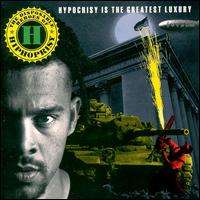Hypocrisy Is the Greatest Luxury
| Hypocrisy Is the Greatest Luxury | ||||
|---|---|---|---|---|
 | ||||
| Studio album by The Disposable Heroes of Hiphoprisy | ||||
| Released | March 3, 1992 | |||
| Genre | Industrial hip hop[1] | |||
| Length | 62:32 | |||
| Label | 4th & B'way, Island, PolyGram | |||
| Producer | Michael Franti | |||
| The Disposable Heroes of Hiphoprisy chronology | ||||
| ||||
Hypocrisy Is the Greatest Luxury is the debut album by alternative hip hop crew The Disposable Heroes of Hiphoprisy, released in 1992. Hypocrisy Is the Greatest Luxury found some critical acclaim, although the album leaned away from the then-rising G-Funk that came to be the dominant subgenre within West Coast hip hop.
“Television, the Drug of the Nation” was released as a single. It was recorded previously by Michael Franti's first band, the Beatnigs.
Critical reception
| Professional ratings | |
|---|---|
| Review scores | |
| Source | Rating |
| AllMusic | |
| Chicago Tribune | |
| Drowned in Sound | 10/10[4] |
| Encyclopedia of Popular Music | |
| Los Angeles Times | |
| Q | |
| Rolling Stone | |
| Select | 4/5[9] |
| The Village Voice | A−[10] |
In a contemporary review for The Village Voice, music critic Robert Christgau said that, although some of the ideas and metaphors are unconvincing, Michael Franti's "intellectual grasp thrusts him immediately into pop's front rank". He also praised DJ Rono Tse as "a one-man hip hop band" who, with the help of percussionist Mark Pistel, "creates more music than he samples, stretching Bomb Squad parameters to carry the tracks whenever Franti falters."[10] Hypocrisy Is the Greatest Luxury finished number 19 in The Village Voice's Pazz & Jop critics' poll.[11] Christgau, the poll's creator, ranked it number 14 in his own list.[12]
In a retrospective review, AllMusic's Ned Raggett said that the group "tackled every last big issue possible with one of 1992's most underrated efforts." He felt that, while its mix of "Bomb Squad and industrial music approaches" make it an appealing album, Franti's thematic breadth and "rich voice" are highlights.[2]
Track listing
- "Satanic Reverses" (Franti) – 4:45
- "Famous and Dandy (Like Amos and Andy)" (Franti) – 6:34
- "Television, the Drug of the Nation" (Franti) – 6:38
- "Language of Violence" (Franti) – 6:15
- "The Winter of the Long Hot Summer" (Franti) – 7:59
- "Hypocrisy Is the Greatest Luxury" (Franti) – 3:47
- "Everyday Life Has Become a Health Risk" (Franti) – 4:54
- "INS Greencard A-19 191 500" (Franti) – 1:36
- "Socio-Genetic Experiment" (Franti) – 4:19
- "Music and Politics" (Franti) – 4:01
- "Financial Leprosy" (Franti) – 5:30
- "California Über Alles" (Biafra/Greenway) – 4:13
- "Water Pistol Man" (Franti) – 5:55
Samples
- "Satanic Reverses"
- Miles Davis - "Miles Runs The Voodoo Down"
- "Famous and Dandy"
- "Television, the Drug of the Nation"
- The Meters - "Look-Ka-Py-Py"
- "Language of Violence"
- This Mortal Coil - "Barramundi"
- "The Winter of the Long Hot Summer"
- This Mortal Coil - "Waves Become Wings"
- Wally Badarou - "Ayers Rock Bubble Eyes"
- "Everyday Life Has Become a Health Risk'
- Public Enemy - "Terminator X to the Edge of Panic"
- "California Über Alles"
- "Water Pistol Man"
- Wally Badarou - "Leaving this Place"
Personnel
- John Baker - Engineer
- Kim Buie - Art Direction
- The Disposable Heroes of Hiphoprisy - Editing, Art Direction, Mixing
- Michael Franti - Arranger, Programming, Vocals, Backing Vocals
- Vivian Hall
- Mark Heimback-Nielsen - Art Direction, Design
- Charlie Hunter - Bass, Guitar, Vocals, Voices
- Jeff Mann - Post Production Engineer
- Mark Pistel - Arranger, Programming, Engineer, Mixing
- Pete Scaturro - Engineer
- Rono Tse - Percussion, Drums, Drums (Steel), Noise, Sheet Metal
- Barbara Walker - Assistant Photographer
- Howie Weinberg - Mastering
- Simone White - Drums
- Mat Callahan - Engineer
- Jack Dangers - Mixing
- Victor Hall - Art Direction, Photography
- Jay Blakesberg - Photography
- Sean Mathis - Assistant Photographer
References
- ↑ Christgau, Robert (April 1992). "Fast Cuts". Playboy. Retrieved May 30, 2013.
- 1 2 Raggett, Ned. "Hypocrisy Is the Greatest Luxury – The Disposable Heroes of Hiphoprisy". AllMusic. Retrieved May 30, 2013.
- ↑ Heim, Chris (April 16, 1992). "Disposable Heroes of Hiphoprisy: Hypocrisy Is the Greatest Luxury (4th & B`Way)". Chicago Tribune. Retrieved October 22, 2016.
- ↑ Reed, Graham (27 June 2002). "Hypocrisy Is the Greatest Luxury Review". Drowned in Sound. Retrieved 26 June 2016.
- ↑ Larkin, Colin (2007). The Encyclopedia of Popular Music (5th ed.). Omnibus Press. ISBN 0-857-12595-8.
- ↑ Oumano, Elena (March 29, 1992). "Disposable Heroes of Hiphoprisy, 'Hypocrisy is the Greatest Luxury,' 4th & Broadway". Los Angeles Times. Retrieved October 22, 2016.
- ↑ "The Disposable Heroes of Hiphoprisy: Hypocrisy Is the Greatest Luxury". Q. London (68): 74. May 1992.
- ↑ "The Disposable Heroes of Hiphoprisy: Hypocrisy Is the Greatest Luxury". Rolling Stone. New York: 108. May 14, 1992.
- ↑ Higginbotham, Adam (May 1992). "American Vitriol". Select. London (23): 64.
- 1 2 Christgau, Robert (April 21, 1992). "Consumer Guide". The Village Voice. New York. Retrieved May 30, 2013.
- ↑ "The 1992 Pazz & Jop Critics Poll". The Village Voice. New York. March 2, 1993. Retrieved May 30, 2013.
- ↑ Christgau, Robert (March 2, 1993). "Pazz & Jop 1992: Dean's List". The Village Voice. New York. Retrieved May 30, 2013.
- ↑ Rap Sample FAQ